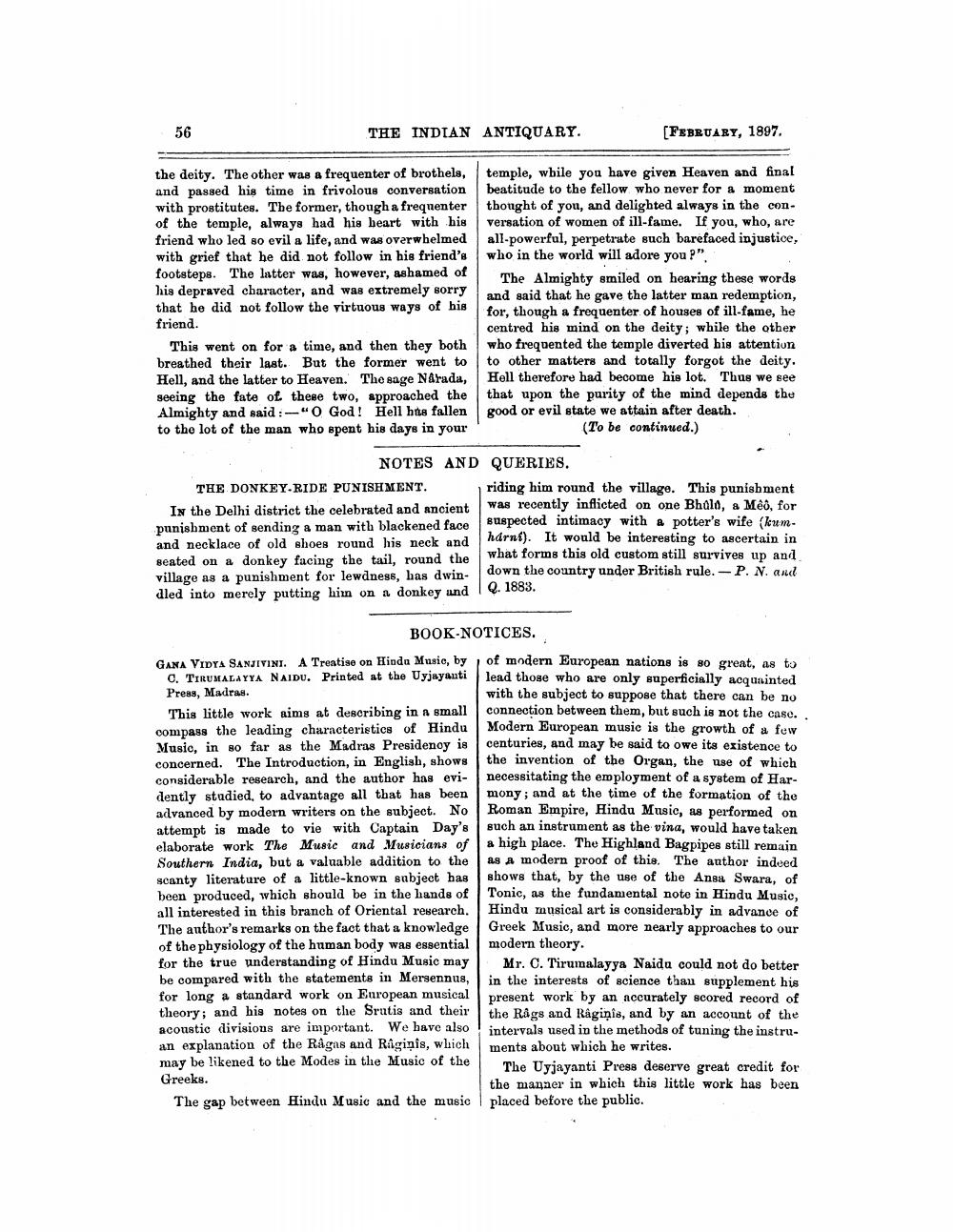________________
56
THE INDIAN ANTIQUARY.
the deity. The other was a frequenter of brothels, and passed his time in frivolous conversation with prostitutes. The former, though a frequenter of the temple, always had his heart with his friend who led so evil a life, and was overwhelmed with grief that he did not follow in his friend's footsteps. The latter was, however, ashamed of his depraved character, and was extremely sorry that he did not follow the virtuous ways of his
friend.
This went on for a time, and then they both breathed their last. But the former went to Hell, and the latter to Heaven. The sage Narada, seeing the fate of these two, approached the Almighty and said:"O God! Hell has fallen to the lot of the man who spent his days in your
THE DONKEY-RIDE PUNISHMENT.
In the Delhi district the celebrated and ancient punishment of sending a man with blackened face and necklace of old shoes round his neck and seated on a donkey facing the tail, round the village as a punishment for lewdness, has dwindled into merely putting him on a donkey and
[FEBRUARY, 1897.
temple, while you have given Heaven and final beatitude to the fellow who never for a moment thought of you, and delighted always in the conversation of women of ill-fame. If you, who, are all-powerful, perpetrate such barefaced injustice, who in the world will adore you?".
NOTES AND QUERIES.
The Almighty smiled on hearing these words and said that he gave the latter man redemption, for, though a frequenter of houses of ill-fame, he centred his mind on the deity; while the other who frequented the temple diverted his attention to other matters and totally forgot the deity. Hell therefore had become his lot. Thus we see that upon the purity of the mind depends the good or evil state we attain after death. (To be continued.)
GANA VIDYA SANJIVINI. A Treatise on Hindu Music, by C. TIRUMALAYYA NAIDU. Printed at the Uyjayanti Press, Madras.
riding him round the village. This punishment was recently inflicted on one Bhûlé, a Mèo, for suspected intimacy with a potter's wife (kumhární). It would be interesting to ascertain in what forms this old custom still survives up and down the country under British rule.-P. N. and Q. 1883.
BOOK-NOTICES.
of modern European nations is so great, as to lead those who are only superficially acquainted with the subject to suppose that there can be no connection between them, but such is not the case.. Modern European music is the growth of a few centuries, and may be said to owe its existence to the invention of the Organ, the use of which necessitating the employment of a system of Harmony; and at the time of the formation of the Roman Empire, Hindu Music, as performed on such an instrument as the vina, would have taken a high place. The Highland Bagpipes still remain as a modern proof of this. The author indeed shows that, by the use of the Ansa Swara, of Tonic, as the fundamental note in Hindu Music, Hindu musical art is considerably in advance of Greek Music, and more nearly approaches to our modern theory.
This little work aims at describing in a small compass the leading characteristics of Hindu Music, in so far as the Madras Presidency is concerned. The Introduction, in English, shows considerable research, and the author has evidently studied, to advantage all that has been advanced by modern writers on the subject. No attempt is made to vie with Captain Day's elaborate work The Music and Musicians of Southern India, but a valuable addition to the scanty literature of a little-known subject has been produced, which should be in the hands of all interested in this branch of Oriental research. The author's remarks on the fact that a knowledge of the physiology of the human body was essential for the true understanding of Hindu Music may be compared with the statements in Mersennus, for long a standard work on European musical theory; and his notes on the Srutis and their acoustic divisions are important. We have also an explanation of the Râgas and Raginis, which may be likened to the Modes in the Music of the The Uyjayanti Press deserve great credit for Greeks. the manner in which this little work has been The gap between Hindu Music and the music placed before the public.
Mr. C. Tirumalayya Naidu could not do better in the interests of science than supplement his present work by an accurately scored record of the Rågs and Raginîs, and by an account of the intervals used in the methods of tuning the instruments about which he writes.




